 Despite pressure from governments and environmental groups, illegal logging and deforestation are facts of life in many developing countries around the world. However, according to a study led by University of Florida professor Jack Putz, selective logging could potentially address these issues.
Despite pressure from governments and environmental groups, illegal logging and deforestation are facts of life in many developing countries around the world. However, according to a study led by University of Florida professor Jack Putz, selective logging could potentially address these issues.
Selective logging, as the name suggests, is not a perfect solution. In a selective logging operation, only the trees of commercial value are removed. The goal is that the forest will have enough trees left to regenerate so it can be harvested sustainably. (Journal of Applied Ecology). A 2005 article in the Stanford Report cited a study revealing the previously-hidden destruction of selective logging. At the time it was published, satellite images had just begun to detect areas where selective logging had gone undetected. Speaking on the topic of logging, Putz stated, “We aren’t advocates for logging…we’re just acknowledging that it is a reality—and that within that reality, there is a way forward.”
With that said, Putz’s research shows there are some benefits to selective logging. While it does affect biodiversity and carbon retention negatively, the damage is “survivable and reversible to a degree” if the forest has enough time to recover. In forests where selective logging had occurred, he found that they retained between 85 and 100 percent of their former animal and plant species diversity, and roughly 76 percent of their carbon. Putz and his team came to these conclusions after analyzing 100 studies covering three continents on tropical forests with logging operations.
In large part, tropical forests are developed to produce agricultural products such as food, feed, and increasingly, fuel. View deforestation rates here. The strong economic incentives for these products is what leads to deforestation. According to Putz, a forest sustainably managed to retain trees and biodiversity can net roughly $2,000 per acre every 20 to 30 years, while a palm oil plantation can earn the same in less than one year. Despite the huge financial incentive against sustainable harvesting, Putz says crackdowns on illegal logging operations can help raise the price of sustainably-logged timber. Though far from an ideal solution, Putz, an applied ecologist, believes it may be one of the only options that will work in the real world.

